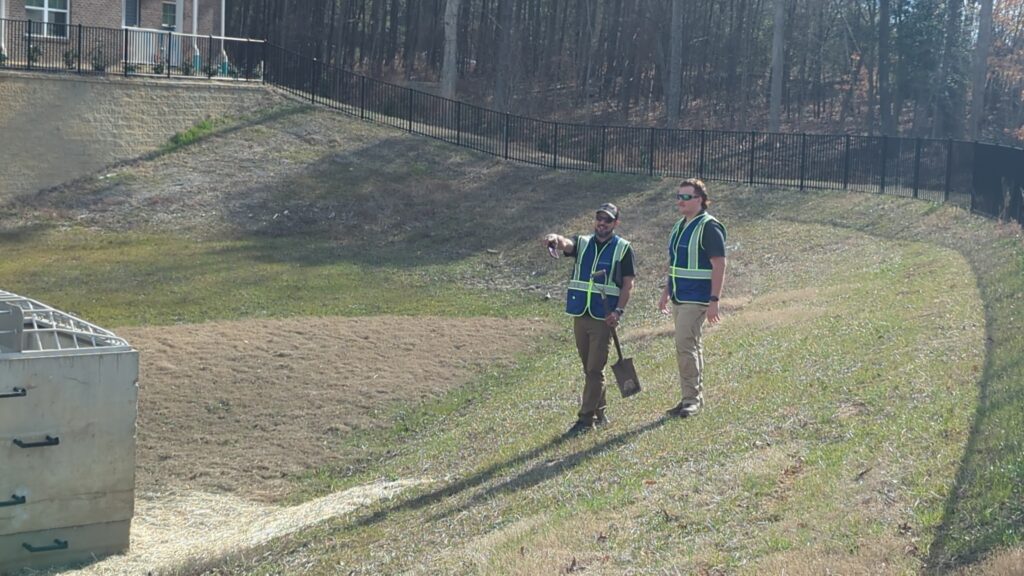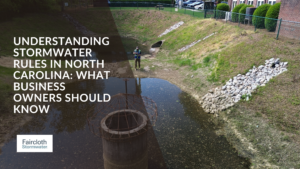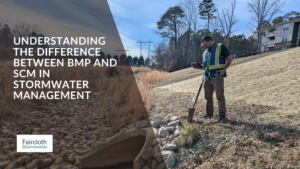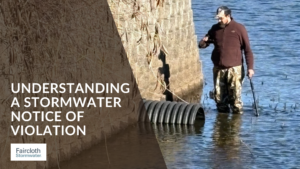Stormwater management plays a critical role in protecting North Carolina’s waterways and environment. For business owners, utilizingt stormwater compliance assistance services is not only a legal requirement but also an environmental responsibility. This guide outlines key information about North Carolina’s stormwater regulations and how they may affect your business.
What is Stormwater and Why It Matters
Stormwater is rain that washes over rooftops, parking lots and roads. This runoff collects oil, chemicals, sediment and trash before flowing into streams, rivers and lakes. Left unmanaged, these contaminants kill fish, spoil drinking water and worsen flooding.
In North Carolina, the Division of Energy, Mineral, and Land Resources (DEMLR) within the Department of Environmental Quality (DEQ) manages stormwater policies. Their approach blends federal Clean Water Act mandates with specific concerns for NC’s unique watersheds.
Types of Stormwater Permits in North Carolina
NC business owners might need various stormwater permits based on their operations and industry. Finding the right permit is your first step toward compliance.
NPDES Industrial Stormwater Permits
The National Pollutant Discharge Elimination System (NPDES) program controls industrial stormwater discharges. NC offers stormwater engineering services through three permit categories:
- General Industrial Permits: Cover common industrial activities with stormwater discharge potential. About 3,200 NC facilities use these permits. Requirements vary by industry and pollution risks.
- Individual Industrial Permits: For operations not eligible for general permits. Roughly 160 NC facilities hold these highly customized permits with site-specific conditions.
- No Exposure Certifications: For industrial sites that shield materials from rain and provide containment. This simpler option works for qualifying facilities while meeting environmental standards.
Construction Stormwater Permits
When disturbing an acre or more during construction, you’ll need a construction stormwater permit from NCDEQ. Requirements include:
- Creating an Erosion and Sedimentation Control Plan
- Getting Division of Land Resources approval
- Installing ground stabilization and proper basin design
- Conducting site inspections throughout construction
- Keeping detailed compliance records
These permits stay active until permanent vegetation or approved ground cover stabilizes the site. Selling property with an active permit? You’ll need specific documentation and certifications for the transfer.

Post-Construction Stormwater Requirements
Once development finishes, you’ll likely need to maintain stormwater control measures (SCMs) for ongoing runoff management. Requirements vary based on:
- Your location (coastal zones, water supply areas, high-quality waters)
- How much impervious surface you’ve created
- How close you are to sensitive waters
- Local rules, which often exceed state standards
Post-construction requirements mean long-term maintenance commitments. Budget for regular inspections, upkeep and possible repairs to stay compliant with regulations.
Key Compliance Requirements for Businesses
Stormwater Pollution Prevention Plan (SWPPP)
Industrial facilities with stormwater permits must create and maintain a Stormwater Pollution Prevention Plan with these elements:
- Maps showing drainage patterns and discharge points
- Practical steps to prevent stormwater pollution
- Procedures to handle spills quickly
- Staff training protocols with documentation
- Scheduled inspections and record-keeping systems
Your SWPPP forms the backbone of compliance efforts and must stay updated as your site changes. NC requires specific formatting and content in these plans, which you must keep on-site for inspectors.
Monitoring and Reporting
Permit holders must:
- Inspect stormwater controls regularly
- Collect water samples during qualifying storms
- File Discharge Monitoring Reports with DEMLR
- Pay yearly permit fees
- Keep records for at least three years
NC now uses electronic reporting for most industrial sites. The e-reporting system saves time but requires learning new digital submission methods.
Special Watershed Protections
Businesses in certain watersheds face stricter rules:
- Neuse River Basin: Must follow Neuse Nutrient Strategy limits on nitrogen and phosphorus to combat water quality issues.
- Water Supply Watersheds: Face tighter restrictions on impervious surfaces to protect drinking water.
- High Quality Waters and Outstanding Resource Waters: Need advanced treatment systems with higher performance standards.
Common Compliance Challenges
NC businesses often struggle with these stormwater regulation hurdles:
- Figuring out which permits fit their specific industry
- Creating workable pollution prevention practices that satisfy regulators
- Taking proper water samples during storms
- Tracking regulatory updates during five-year permit cycles
- Managing compliance costs alongside daily operations
These problems hit smaller businesses hardest. The technical complexity of stormwater rules demands specialized knowledge many companies lack in-house.
Financial Considerations
Stormwater compliance costs include:
- Permit application fees
- Yearly permit renewal fees
- Installing and maintaining control systems
- Water testing equipment and lab analysis
- Professional help with inspections and reporting
- Fixing aging stormwater infrastructure
Small to medium NC businesses typically spend several thousand dollars in year one, with costs reaching tens of thousands for complex facilities. Annual expenses afterward run $1,000+ for smaller sites and much more for larger operations. Smart planning helps avoid costly emergency fixes.
Tips for Effective Stormwater Management
Try these practical strategies to improve your compliance and cut risks:
- Map your site thoroughly to spot pollution sources and vulnerable areas needing extra protection
- Train your team on preventing stormwater pollution with clear assignments and regular updates
- Fix problems early by maintaining stormwater systems before they fail during heavy rain
- Keep detailed records of inspections, water testing, maintenance work and staff training
- Bring in experts for complex permit applications and renewals
Working with qualified engineers and stormwater specialists saves money and time while reducing violation risks. Professional guidance helps navigate regulatory pitfalls that could trigger costly enforcement actions.
Request a Consultation
Need help navigating North Carolina’s stormwater regulations? Faircloth Stormwater’s compliance assistance services are designed to keep your business compliant and protected.
Request a custom consultation and get expert support today.




